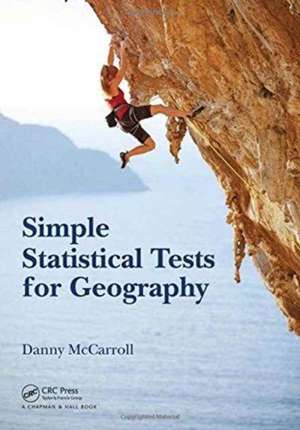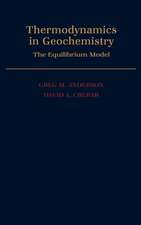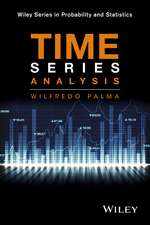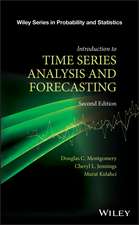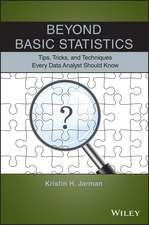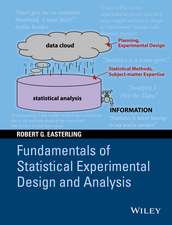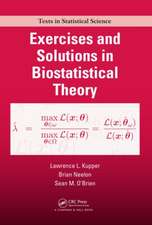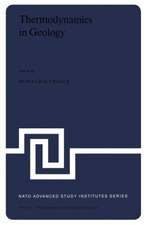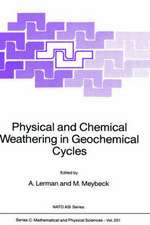Simple Statistical Tests for Geography
Autor Danny McCarrollen Limba Engleză Paperback – 11 oct 2016
Although aimed directly at geography students at senior undergraduate and graduate level, this book provides an accessible introduction to a wide range of statistical methods and will be of value to students and researchers in allied disciplines including Earth and environmental science, and the social sciences.
| Toate formatele și edițiile | Preț | Express |
|---|---|---|
| Paperback (1) | 275.01 lei 3-5 săpt. | +35.01 lei 6-12 zile |
| CRC Press – 11 oct 2016 | 275.01 lei 3-5 săpt. | +35.01 lei 6-12 zile |
| Hardback (1) | 1326.99 lei 6-8 săpt. | |
| CRC Press – 2 aug 2017 | 1326.99 lei 6-8 săpt. |
Preț: 275.01 lei
Nou
Puncte Express: 413
Preț estimativ în valută:
52.62€ • 55.24$ • 43.68£
52.62€ • 55.24$ • 43.68£
Carte disponibilă
Livrare economică 20 martie-03 aprilie
Livrare express 05-11 martie pentru 44.100 lei
Preluare comenzi: 021 569.72.76
Specificații
ISBN-13: 9781498758819
ISBN-10: 1498758819
Pagini: 360
Ilustrații: 25
Dimensiuni: 178 x 254 x 24 mm
Greutate: 0.68 kg
Ediția:1
Editura: CRC Press
Colecția Chapman and Hall/CRC
ISBN-10: 1498758819
Pagini: 360
Ilustrații: 25
Dimensiuni: 178 x 254 x 24 mm
Greutate: 0.68 kg
Ediția:1
Editura: CRC Press
Colecția Chapman and Hall/CRC
Cuprins
Introduction; How to use statistics; Types of data and types of test; Tools of the trade; Single sample tests: is my sample representative or biased?; Two-sample tests for counts in categories data; Two-sample tests for individual measurements; More than 2 samples: are these 3 or more samples different?; Looking at relationships; 10 Conclusions; Appendices.
Recenzii
"This is an unusual and exceptional book! It is designed for geography students who want to carry out statistical tests. It is not for teachers or lecturers, and certainly not for practising statisticians. It is for budding geographers who have interesting data, collected as part of, say, an undergraduate (or even postgraduate) project, who need to derive wider meaning from their results and give their study its due significance. In order to achieve this aim it is written in a most engaging fashion, directed at the student colleague, and is designed around the experiments that the students are likely to encounter in their undergraduate course. The book is functional throughout. It starts with the geographical question (i.e. when is the statistical test useful?), and then takes the student through the rationale, and the process of how to carry out the test. Functionality persists, and the student is directed how to carry out the test in a variety of ways: manually, with a range of calculators, or with the appropriate or convenient statistical package such as SPSS. To wrap up each method, the book gives worked examples, of interest to both physical and human Geographers.
Because Geographers deal with complex problems that are unlikely to yield appropriate distributions with sound, probabilistic assumptions, this book is focussed on non-parametric tests and concentrates on issues such as the inevitably unsuitable sample size, or complex and maybe extreme distributions. With this in mind, Professor Danny McCarroll takes his student ‘colleagues’ through the basics and reality of what is needed to do their work. In so doing, the book introduces them to hypotheses, probability, data and distributions that underpin their experiment and leads them through the practicalities of deriving their statistical implications. The book has even included a series of spreadsheets, accessible through a hyperlink that can be used to input data and carry out the statistical test without need to use the usual specialised software. With this structure, the book takes the user through, for instance: Chi-Square Tests, Kolmogorov-Smirnov Tests, Mann-Whitney U-Test, Siegel-Tukey Test and correlation with, for instance, Spearman’s Rank and Regression Analysis. Retaining its practicality to the end, the book concludes with tables of Critical Values for the various tests explained in the preceding text. This is an outstanding book that will not only bring satisfaction for coming generations of students, but is likely to greatly increase the value of early research carried out by geography undergraduates, wherever they may be."
—Emeritus Professor Jim Rose, Department of Geography, Royal Holloway, University of London, Visiting Research Associate, British Geological Survey
"Prof. Danny McCarroll is an excellent geographer with a lot of experience in teaching statistical methods for geographers. In this book, Prof. McCarroll aims to overcome the fear of numbers; instead encouraging students to focus on the geographical problems that interest them and use whatever statistical tools they need in order to tackle such problems. In comparison to traditional statistics books, the author focuses mainly on nonparametric (distribution-free) methods, which are the most appropriate for geography students to work with due to the scale of study and the type of data that they encounter. However, the last chapters do also introduce widely-used parametric methods such as correlation and regression. Each technique taught in this book can be adopted and utilized quickly and easily using a range of tools including free online calculators, free add-ins or using specialist software (SPSS, R). This is a fantastic book for students, who can design the sampling scheme to fit the desired test before collecting data and look for clear guidance on how to analyse collected data."
—Prof. Jürg Luterbacher, Director Department of Geography, Justus Liebig University of Giessen, Germany
Because Geographers deal with complex problems that are unlikely to yield appropriate distributions with sound, probabilistic assumptions, this book is focussed on non-parametric tests and concentrates on issues such as the inevitably unsuitable sample size, or complex and maybe extreme distributions. With this in mind, Professor Danny McCarroll takes his student ‘colleagues’ through the basics and reality of what is needed to do their work. In so doing, the book introduces them to hypotheses, probability, data and distributions that underpin their experiment and leads them through the practicalities of deriving their statistical implications. The book has even included a series of spreadsheets, accessible through a hyperlink that can be used to input data and carry out the statistical test without need to use the usual specialised software. With this structure, the book takes the user through, for instance: Chi-Square Tests, Kolmogorov-Smirnov Tests, Mann-Whitney U-Test, Siegel-Tukey Test and correlation with, for instance, Spearman’s Rank and Regression Analysis. Retaining its practicality to the end, the book concludes with tables of Critical Values for the various tests explained in the preceding text. This is an outstanding book that will not only bring satisfaction for coming generations of students, but is likely to greatly increase the value of early research carried out by geography undergraduates, wherever they may be."
—Emeritus Professor Jim Rose, Department of Geography, Royal Holloway, University of London, Visiting Research Associate, British Geological Survey
"Prof. Danny McCarroll is an excellent geographer with a lot of experience in teaching statistical methods for geographers. In this book, Prof. McCarroll aims to overcome the fear of numbers; instead encouraging students to focus on the geographical problems that interest them and use whatever statistical tools they need in order to tackle such problems. In comparison to traditional statistics books, the author focuses mainly on nonparametric (distribution-free) methods, which are the most appropriate for geography students to work with due to the scale of study and the type of data that they encounter. However, the last chapters do also introduce widely-used parametric methods such as correlation and regression. Each technique taught in this book can be adopted and utilized quickly and easily using a range of tools including free online calculators, free add-ins or using specialist software (SPSS, R). This is a fantastic book for students, who can design the sampling scheme to fit the desired test before collecting data and look for clear guidance on how to analyse collected data."
—Prof. Jürg Luterbacher, Director Department of Geography, Justus Liebig University of Giessen, Germany
Notă biografică
Danny McCarroll completed a Geography degree at the University of Sheffield in 1983 and a PhD, on Little Ice Age fluctuations of Norwegian glaciers, at Swansea University in 1986. He later worked for a few years in the Universities of Cardiff and Southampton before returning to Swansea, where he has sincereceived awards for excellence in both teaching and research as well as a Personal Chair. His research interests include geomorphology, reconstructing Quaternary environments and high resolution climate reconstruction, particularly using tree rings. He coordinated the European Union funded ‘Millennium’ project which brought together an interdisciplinary team of more than 100 scientists from 40 universities to reconstruct the climate of Europe over the last one thousand years. He has more than 100 publications in international journals.
Descriere
This book is aimed directly at students of geography, particularly those who lack confidence in manipulating numbers. The aim is not to teach the mathematics behind statistical tests, but to focus on the logic, so that students can choose the most appropriate tests, apply them in the most convenient way and make sense of the results. Introductory chapters explain how to use statistical methods and then the tests are arranged according to the type of data that they require. Diagrams are used to guide students toward the most appropriate tests. The focus is on nonparametric methods that make very few assumptions and are appropriate for the kinds of data that many students will collect. Parametric methods, including Student’s t-tests, correlation and regression are also covered.
